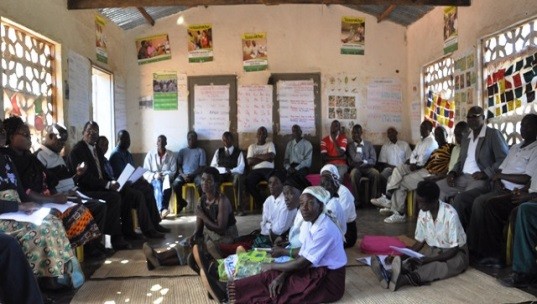
Nov. 2014—Christopher and Ndaziona Kachingwe of Ng’ombe in Malawi’s Machinga district were having problems in their family when an HIV-prevention project was first introduced in the area five years ago. Now they are happier, healthier and better informed on how to remain so.
Through the USAID Bridge II project, the couple started attending village discussions on how having more than one sexual partner can put them in a sexual network, and at a higher risk of contracting HIV. The discussions led them to marriage counseling and HIV testing.
“Faith-based marriage counseling under Bridge II encouraged me to go for HIV testing. People from my community discouraged us from going for marriage counseling. They argued that there was nothing new we could learn,” said Ndaziona.
The project, implemented in 11 districts, began in 2009 and ends in 2014. Funded by the U.S. President’s Emergency Plan for AIDS Relief through USAID, it is designed to promote behavior change and increase HIV preventive behavior among the adult population in Malawi.
In the last year alone, almost 60,000 people accessed HIV testing and counseling services, condoms, family planning and voluntary medical male circumcision. Moreover, 3,500 men and nearly 7,500 women received HIV testing and counseling during “open days” sessions, when local clinics were open to the public specifically for this purpose.
The project worked with community-based organizations, district level AIDS coordinating committees and at the national level to strengthen overall capacity to plan and implement comprehensive prevention programs and mobilization strategies.
The activities were far-reaching but locally based and included counseling for couples, linking people to hospitals, and engaging people living with HIV through radio campaigns and open discussions. The result: Couples like Christopher and Ndaziona are now enjoying health and well-being.
Over the past five years, support groups for people living with HIV and AIDS in Malawi have helped people discuss and develop strategies for coping with effects of the disease on their families and communities. Pertinent issues affecting people living with HIV and AIDS are addressed in guides and toolkits. This information is lifesaving: People discovered that there is life after being diagnosed with HIV.
Alice*, a business woman in Mbalame village, Traditional Authority Mpama, Chiradzulu district, initially lost hope after receiving an HIV-positive diagnosis. After attending various project activities, Alice turned into an entrepreneur—and a happier person.
“When I was diagnosed with HIV, I was helpless. I stopped doing any meaningful activities in my life. I even stopped sending my children to school because I thought their education will no longer benefit me in any way. I thought I would die. But through the Journey of Hope toolkit, I realized there is hope for the future. I joined a village saving group where I managed to raise money to start my own business, through which I have built two houses. I now send my children to school and we are all happy,” said Alice.
Behavior has changed for the better during the course of the project. Issues of discrimination and stigma are largely a thing of the past.
“I used to bad-mouth and pass judgment on people who were HIV-positive based on their appearance until I learned about HIV and AIDS,” says Mary* of Mtenje village. “Now I am no longer discriminatory against anyone and I understand that an HIV test is the only way a person can know their status.”
*Full name withheld to protect privacy.
LINKS
Follow on Facebook







Comment
Make a general inquiry or suggest an improvement.